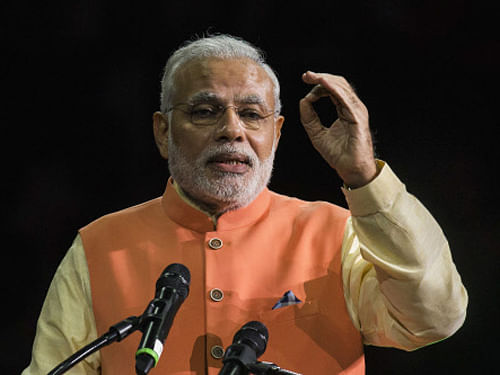
Prime Minister Narendra Modi's forthcoming visit from July 6-13 to Russia as also five Central Asian countries is expected to boost strategic and economic ties with the region, India Inc said today.
"Consequent to India increasing FDI up to 49 per cent in the defence production, its economic relations with Russia are expected to see a dramatic change with the Prime Minister's visit to the CIS countries giving an extra push to strategic ties with the region," industry body Assocham said.
With focus on enhancing strategic, economic and energy ties, Modi is scheduled to travel from July 6 to 13 to five Central Asian countries and Russia where he will attend the summits of BRICS and Shanghai Cooperation Organisation (SCO).
The Prime Minister's visit will start with Uzbekistan from where he will go to Kazakhstan on July 7. He will then travel to Russia on July 8, before moving to Turkmenistan on July 10, Kyrgyzstan on July 11 and Tajikistan on July 12.
Terming Modi's visit to Central Asia a "landmark" event to revitalise our ancient links with the region, the Confederation of Indian Industry (CII) estimated that trade with the five Central Asian countries of Kazakhstan, Turkmenistan, Tajikistan, Uzbekistan and Kyrgyzstan can grow manifold from the small base of USD 1.4 billion currently.
Stressing on the need to develop more transport corridors to connect India to the Central Asian region, the CII said priority must be given to the TAPI (Turkmenistan-Afghanistan- Iran-Pakistan) pipeline project.
It also recommended the energy sector be accorded high priority, as Kazakhstan is a significant oil producer while the other countries are estimated to have large reserves of natural gas.
The CII said major areas of opportunity for India in Central Asia include oil and gas, minerals and metals, agricultural products, pharmaceuticals, textiles and chemicals.
The industry body said trade with the region can grow manifold provided the right connectivity is put in place.
According to Assocham, the recent hike in FDI limit to 49 per cent is expected to bring more investments, particularly from Russia into the defence sector.
Earlier, FDI limit of 26 per cent was the main hurdle holding back global OEMs (original equipment manufacturers) from investing in the Indian defence production, it said.
India-Russia bilateral trade of about USD 7 billion has not only remained much below the potential, it has also remained highly skewed for a few items besides defence sector.
The bilateral investment has also remained at subdued level of USD 8 billion, Assocham said.
It suggested that with liberalisation of policies for FDI in defence production, India should collaborate with Russia to set up a Special Economic Zone for defence and aerospace.
Outlining the significance of Indo-Russia ties, Assocham Secretary General D S Rawat said: "Russia has been a trusted and an old friend of India. However, due to geo-political reasons, the country has been isolated by the western world.
"India should stand by this friend and extend the fullest economic cooperation to it when Russia needs it most. Our Prime Minister should make it loud and clear that India remains a trusted friend of Russia," it added.
India's exports to the five Central Asian countries at USD 604.32 million and its imports at USD 775.73 million.
Kazakhstan is India's largest trading partner among the five countries, and trade has seen a rapid expansion as India is sourcing mineral fuels from the country.